Approximately one in four people in the UK will experience a mental health problem each year, many of whom encounter workplace discrimination. We’re helping you understand not just what discrimination looks like, but how to fight it…
Work should be a place where we flourish – where we play to our strengths, develop new skills, and feel safe to be ourselves. But, often the reality is very different, and instead of working in an environment that supports wellbeing, 88% of people severely affected by mental illness report that discrimination is widespread, according to a 2021 survey by Rethink Mental Illness.
For marginalised identities, things may be even harder – with a quarter of LGBTQIA+ workers with a disability believing it’s likely they will lose their job in the next year, compared to 10% who are LGBTQIA+ but aren’t disabled, according to the Business in the Community 2019 Mental Health at Work Report. And while 51% of employees feel comfortable talking in the workplace about mental health, only 40% of the global majority feel the same.
As someone with mental ill-health and a visual impairment, I’ve faced discriminatory attitudes at work, from being denied time off for appointments to unkind comments. It’s normal to have worries about approaching these situations, and also, whether what we’ve been through actually counts as discrimination.
Understanding discrimination
“Mental health discrimination is when you’re treated worse than someone else, because you have a mental health problem,” says Stephen Buckley, head of information at the charity Mind. “You have to show there’s a link between your mental health problem, and the way you’ve been treated.”
There are laws in place to protect us from discrimination. “Even if you don’t think you have a disability, the Equality Act may protect you from discrimination if your mental health problem fits its definition of disability,” Stephen says.
For it to count as a disability, you need to show that your mental health problem:
- Has more than a small effect on your everyday life
- Makes things more difficult for you
- Has lasted at least 12 months, or is likely to last 12 months. Or, if your mental health problem has improved, that it’s likely to recur.
There are lots of forms of discrimination that people experience. One example is direct disability discrimination – which Acas (the public body providing free and impartial advice to employers, employees, and their representatives) defines as someone being put at a disadvantage or treated less favourably because they’re disabled. In an example, Mind refers to someone with bipolar disorder who asks their employer if they can apply for a new role doing work they feel more able to do. Their employer says they can’t apply because of their mental health problem.
Another form of discrimination is known as indirect discrimination which, Acas says, “is when a working practice, policy, or rule applies to everyone, but puts a person or group at a disadvantage because of their disability”. Relating it specifically to mental health, Mind says an example could be if someone’s employer decides all staff must start a new shift pattern, which involves working late in the evening. But the employee takes medication for schizoaffective disorder, which makes them sleepy in the evenings, so they aren’t able to work late shifts. This is likely to be indirect discrimination, as it puts them at a disadvantage.

What to do if you think you’ve experienced discrimination
First, know that it’s not your fault if you’ve been treated badly because of your mental health condition, and that it’s normal to feel upset and confused at what to do next.
“If you can, it’s usually best to resolve your problem by just talking it through,” advises Stephen. “This will feel more relaxed, and also helps you to keep good working relationships. Start by speaking to your colleagues, manager, or human resources department as soon as possible.”
If you’re in a trade union, reach out to your representative to tell them in confidence what’s been going on. They can advise on next steps, and support you through the process. I’ve experienced firsthand how helpful it is to have someone who understands workplace procedures on your side – it helps you feel less alone. It’s also worth keeping a written log of what’s happened, recording key details, such as names and dates.
If you aren’t happy with the results of trying to resolve things internally with your employer, then you can look at proceeding to a tribunal. “An employment tribunal makes decisions for disputes between employers and employees about employment rights,” explains Stephen. He stresses that it’s important to understand every part of the process before you start your claim, such as contacting Acas, and going through their ‘early conciliation’ process.
For more information, Citizens Advice has useful guidance on tribunals. The Disability Law Service is a charity that provides information and advice on disability discrimination, including in employment – speaking to them about an issue I had with an employer helped me understand my rights, and to effectively challenge the discrimination.
Looking after yourself
Facing discrimination can be an emotional experience, especially as work is often such a big part of our lives. “Work can provide a sense of purpose, an opportunity to build relationships, create structure in our day, and enable us to support ourselves financially. It can also bring a sense of achievement, as we learn and grow in our roles,” says counsellor Nadia DiLuzio. “Therefore, when we experience mental health discrimination within the workplace, we can feel as if it is an attack on who we innately are as a person.”

Nadia adds that our careers can sometimes feel part of who we are, and that for some people with a mental health condition, this diagnosis can be viewed as part of our identity, too.
To help look after yourself while dealing with discrimination, Nadia recommends you:
-
Acknowledge how you feel, rather than trying to minimise or ignore it.
-
Connect with others, as putting yourself in supportive environments will help to reduce your stress levels.
-
Listen to your self-talk, and then actively work to improve it. Discrimination can feel punishing or rejecting depending on our earlier experiences, and we can allow our critical voice to come forward and tell us we’re not good enough. Affirmations and positive ‘I am’ statements can be a good starting point.
-
Refocus on the parts of your identity that aren’t associated with work. What aspects of yourself – your values, beliefs, passions, and interests – are important to you?
-
If you have thoughts cycling through your mind, write them down. Taking back control over when and where you will allow space for those thoughts will enable you to choose your reaction, and response, to them.
Remember that discrimination is not your fault, and to be kind to yourself while you go through this. There is support out there to help you through the process of challenging discrimination, and to look after your wellbeing while doing so.


Comments